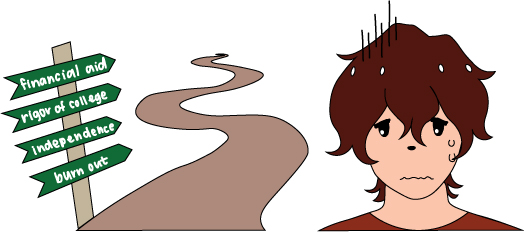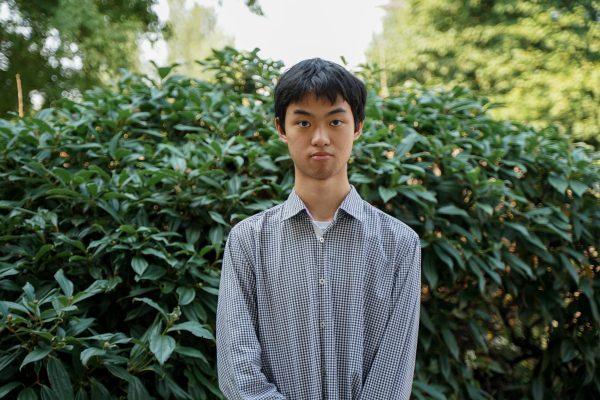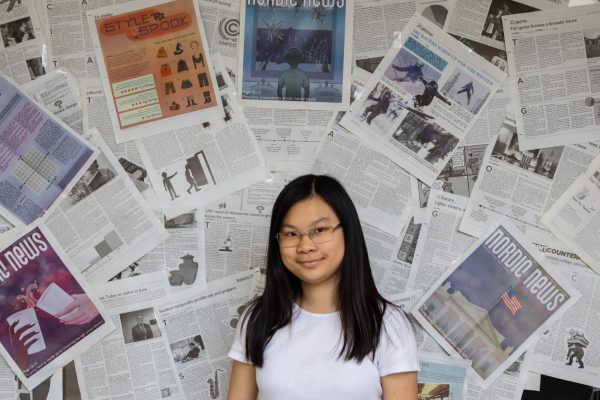In a recent Nordic news survey of 34 seniors, 27 said they felt prepared for college, and 22 said they felt moderately or highly confident they would be able to find a job after being educated for their occupation. However, there is often still a lot of anxiety about the college process and uncertainty about the future; while some anxiety or stress can be healthy and serve as motivation, for many, it can become overwhelming.
Inglemoor college counselor Jim Allen (he/him) helps students with their High School and Beyond Plan and provides information about colleges and scholarships. Allen said he works to remain honest with students about their chances of getting into a particular college. However, he also keeps in mind that their chances of getting a good job aren’t actually too dependent on the college.
“I think it’s especially hard for families whose parents went to school in other countries, where it really is like, ‘If you don’t go to this school, you can’t get that job,’ and where you go to school absolutely matters for what you will get to do moving forward. And that really doesn’t exist here. You don’t have to go to a certain school to get into computer science or to get into Google or to work on Wall Street.”
Allen said that because of misinformation on the internet, students start to spin each other into nervous frenzies about college, which creates a lot of unnecessary anxiety. He said that since colleges are putting an increased emphasis on diversity, there’s no real way to know if they can get in. Nevertheless, the skills students gain from simply pursuing a top college can be used beyond college.
“The students who are pursuing (top colleges) are bettering themselves. They’re learning more, they’re growing, they hit college — whether they get into an Ivy League or not — they hit college so prepared and so ready,” Allen said. “All those habits that the students are building in trying to get into the best school that they could possibly get into are gonna serve them well.”
Senior Shirin Choi (she/her) is committed to the University of Washington Seattle for pre-science. Aside from stress over college applications, Choi said that her main worry is burning out too early. Since Choi plans to also attend medical school after college, she still has many years of school left. To combat this stress, she turns to her support system: her friends and family.
“Surround yourself with people who help you not stress out more. I would say something I had to do — especially this year — was to isolate myself from people who make me more stressed about this kind of stuff,” Choi said.
In contrast, senior Kelly Leong (she/her), who is also committed to the University of Washington Seattle and plans to dual major in architecture and construction management, said she chooses not to turn to others for help. Leong said her biggest concern is taking care of herself and being independent while away at college, especially given her reliance on her parents for decision-making. For this, she admires her older sister’s independence and ability to fit in on the college campus.
“It’s difficult since I do have parents who really push for, or pretty much (are) like, a little bit helicopter parents,” Leong said. “Sometimes, the decisions I make reflect on decisions that they would make, like I don’t feel like I have my own voice, necessarily, in my decisions. But so that’s going to be a little struggle, like just breaking away from constantly relying on them, and to become my own person.”
While Leong feels that people with especially high expectations of themselves are the most stressed, Choi instead attributes it to focusing too much on the negative aspects.
“I feel like everybody is nervous to some extent, but I would say people who are especially nervous are only thinking about the academic aspect of their future, like college,” Choi said. “But if you think about the other parts, like meeting new people, or meeting new friends or staying with your friends and your social life, I think that would take away some stress.”
Senior Ash Haddad (they/he) was accepted into the University of Washington Seattle for political science but has doubts regarding their ability to pay the college fees. Haddad said that the few scholarships they can apply to only open in the beginning of the school year.
“FAFSA is not being very helpful this year. With a lot of financial aid. And because I don’t come from a family that can afford tuition and dorm housing, it’s really stressful. I’ve been trying to apply for scholarships, but it’s like barely any out there,” Haddad said.
For Haddad, student loans are a last-resort option. Although his father is willing to help him pay for college, he said that taking out a student loan may be necessary. His other option is to get a job during summer and college. However, Haddad doesn’t necessarily feel confident in his ability to get a job.
“The problem is currently with the job offers. And like my previous experiences with trying to get jobs, it’s really hard,” Haddad said. “They have like 30 job offers out there and then when you apply for them, they say you’re not qualified, because either you don’t have enough years of experience or you’re not organized.”
Haddad is interested in studying political science, but they recognize the possible necessity of changing their major because of its limited job opportunities. Haddad said it’s hard not to worry about the future. Nevertheless, they said it’s okay to be stressed and that they do believe in investing healthy amounts of their effort into dealing with these problems.
“It’s okay to be stressed and it’s okay to be anxious about the future. You can’t really stop that,” Haddad said. “Do things that can help you not have to be worried as much. Put the effort in to actually help you. Get a job if you can, apply for scholarships, do stuff you can to help you but know that it’s okay for you to be anxious about the future because you can’t really stop that.”
Crisis Text Line
Text HEAL to 741741
Crisis Connections
1-866-427-4747











